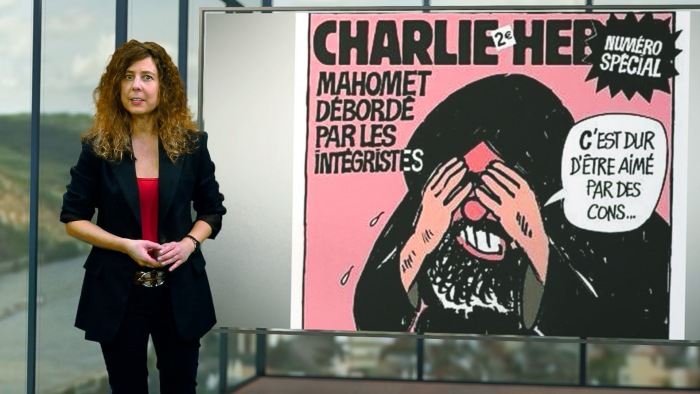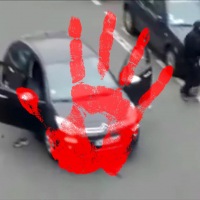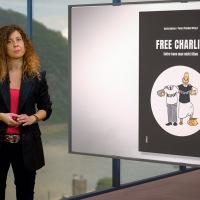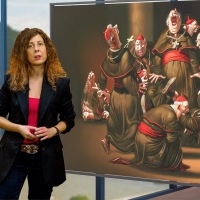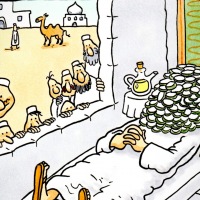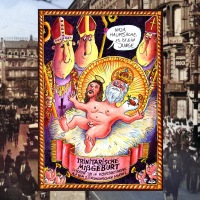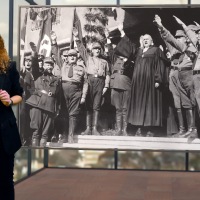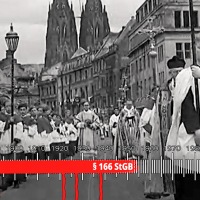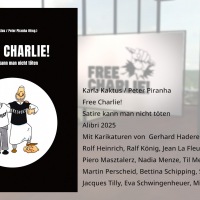»Caution, Humor!« [1]
The film commemorating the 10th anniversary of the attack on »Charlie Hebdo« highlights the fatal effects of religious censorship
"If you fear that religion-critical drawings could tempt you to blow up or, even worse, to blow others up, stop this video immediately!" This is the trigger warning for the "Free Charlie!" film, which was released today on the 10th anniversary of the attack on "Charlie Hebdo" on the YouTube channel of the Giordano Bruno Foundation. It is a determined call not to be intimidated by fundamentalists.
The attack on the »Charlie Hebdo« editorial office in 2015 caused worldwide shock. In Paris alone, 1.5 million people took to the streets. German politicians also participated in the solidarity rallies at that time – but it remained merely symbolic politics: no changes to the law were made in this country, even though it was evident that the surviving members of the "Charlie Hebdo" editorial team could have been convicted under German law. After all, their religion-critical drawings animated fundamentalists to commit terrorist acts, which, according to paragraph 166 of the Criminal Code, can be punished with up to three years in prison.
To prevent such a "perpetrator-victim reversal" in the future, the "Free Charlie!" campaign [3] was launched a year ago with the goal of eliminating the old "blasphemy paragraph" 166 from the Criminal Code. The 35-minute film [4] released today provides strong arguments for pursuing this legal reform despite the recent collapse of the coalition government. On the one hand, it vividly illustrates the "liberating power of satire," which played an important role in the European Enlightenment process, and on the other hand, it highlights the "fatal effects of religious censorship," which has always – and increasingly again – undermined the fundamental principles of an open, productive debate culture. "The degree of freedom in a society is best measured by the leeway it grants its satirists," the video states.
Should one show consideration for religious feelings?
The film script is based on a detailed essay by philosopher and Giordano Bruno Foundation chairman Michael Schmidt-Salomon, written for the cartoon collection "Free Charlie! Satire kann man nicht töten," [5] also published today. Some drawings from the collection were incorporated into the "Free Charlie!" film by director Ricarda Hinz – giving her video documentation a subversive wit despite the serious topic, which could indeed upset religious "humor-allergics" if they do not heed the initial trigger warning.
"Should one show consideration for the apparently very easily vulnerable religious feelings of the devout?" asks author Michael Schmidt-Salomon and provides a clear answer. "No, because this would massively endanger the values of an open society and only worsen the clinical picture of lacking tolerance for criticism and humor among religious fundamentalists!" According to Schmidt-Salomon, we should stop "engaging in a spineless appeasement policy towards extremists." Instead, it is essential to "offensively defend the principles of the free and democratic constitutional order," for which, among other things, the abolition of the old "blasphemy paragraph" 166 is imperative.
The inglorious history of § 166
The "Free Charlie!" film places great emphasis on the historical development of the "blasphemy paragraph," which served the same function in the German Empire, the Weimar Republic, the Nazi dictatorship, and the Federal Republic of Germany. It was always about curbing the "subversive, corrosive spirit" – as the German-Jewish writer Kurt Tucholsky put it, who advocated for the abolition of the "medieval dictatorship paragraph" as early as the 1920s.
"The fundamental function of the paragraph was hardly changed by the Great Criminal Code Reform (TN: of the 1950s and 1960s)," explains Jessica Hamed, deputy chairwoman of the Institute for Secular Law (ifw) [6], who guides viewers through the "Free Charlie!" film as moderator. "Since 1969, § 166 of the Criminal Code may appear in a more modern, ideologically neutral guise – but in practice everything initially remained the same. This is because the paragraph continued to be used only to persecute satirists and religious critics, while Christian fanatics who railed against 'the unbelievers' in harsh words were never held accountable."
With the secularization surge that began in the last quarter of the 20th century, German Christians became so accustomed to religious criticism and satire that they no longer took to the barricades when their faith was caricatured. In the early 2000s, it seemed as if the "blasphemy paragraph" would sink into legal insignificance. But this changed abruptly in 2006 with the so-called "cartoon controversy," which was sparked by Danish Muslim Brotherhood members after the publication of some Mohammed caricatures and cost more than 100 people their lives: "The timid reactions of Western politicians to this escalation of violence were closely observed by national and international Islamists," says the "Free Charlie!" film. "They recognized that § 166 is a perfect gateway to introduce their anti-freedom beliefs into German society."
German prosecutors as henchmen of Islamists
The video documentary illustrates what this looks like in concrete terms using current cases from the city of Hamburg: In 2022, liberal Muslims and ex-Muslims demonstrated in front of the (now banned) "Islamische Zentrum Hamburg" (IZH, Islamic Center Hamburg) against human rights violations in Iran, expressing their outrage over the crimes of this theocratic dictatorship by, among other things, tearing up a Quran. Shortly thereafter, the Iranian mullah regime intervened on several levels and threatened that acts of violence similar to those in the "cartoon controversy" could occur if the demonstrators were not legally held legally accountable.
How did the German authorities and the responsible court respond to these Islamist intimidation attempts? Unfortunately, they did not side with the Iran-critical human rights activists but instead issued them penalty orders of 60 to 90 daily rates based on § 166 of the Criminal Code. In the film, this is commented on as follows: "The Hamburg cases drastically illustrate the problem of the 'blasphemy paragraph,' because it is obvious: § 166 of the Criminal Code condemns German prosecutors to act as henchmen of Islamists!"
In this context, the "Free Charlie!" film also addresses how theocratic states like the "Islamic Republic of Iran" have begun to counter the UN's demand to abolish all blasphemy laws on the international stage by pointing out that secular Germany also threatens the "insulting of religious beliefs" with several years of imprisonment: "This instrumentalization of German legislation alone should be sufficient to banish § 166 of the German Criminal Code from the legal system. After all, German governments have been criticizing blasphemy laws in Islamic countries for many years. This criticism would carry significantly more weight if Germany were to set a good example by abolishing its own 'blasphemy paragraph.'"
§ 166 protects antisemites
The "Free Charlie!" film also takes a hard stance "against the widespread prejudice in political Berlin that § 166 of the Criminal Code could prevent the further spread of antisemitism in Germany." This view is based on a "double misjudgment": "First, it misinterprets the fundamental legal connections – antisemitism is, as is well known, prosecuted under § 130 of the Criminal Code (incitement to hatred), not under § 166! Second, it fails to recognize the core focus of the 'blasphemy paragraph,' which has always been loaded with anti-Jewish resentments."
"Church Father" Ambrose already believed that heretics and Jews were "nothing other than brothers in spirit" – a mindset that, as Michael Schmidt-Salomon explains, "has persisted from the Middle Ages, through the German Empire and the Nazi era, up to the present day." The attacks of January 7, 2015, which were not only directed against "Charlie Hebdo" but also against the Jewish supermarket "Hyper Cacher," are also symptomatic of this: "The fact that on January 7, 2015, not only religious Jews but also cartoonists were murdered is anything but a coincidence. Rather, it reveals a core element of fascist – here: Islamist fascist – ideology. Even for the National Socialists, the satirical treatment of 'the Highest' was considered 'typically Jewish,' a distinctive proof of the allegedly 'culturally corrosive effect' of the 'Jewish world spirit.'"
"There actually were and are disproportionately many people of Jewish descent among the world's well-known cartoonists and satirists," the film states. "One of them was the cartoonist Georges Wolinski, who was murdered on January 7, 2015, in the editorial offices of Charlie Hebdo. His example alone already shows how absurd the widespread notion in the politically sphere is that § 166 of the Criminal Code could prevent antisemitic attacks. Secular Jews like him were never protected by means of a 'blasphemy paragraph' but persecuted. The fact is: § 166 of the Criminal Code protects antisemites, it does not protect against antisemitism!"
explicitly encouraged! +++ A production of the Giordano Bruno Foundation as part of the "Free Charlie!" campaign, 2024/2025 +++ Published on the gbs YouTube channel on 7.1.2025 +++ Public screenings in several cities [17] +++ The book accompanying the film [5] will be published on 7.1.2025 by Alibri Verlag.
Media reports on this article (selection):
- 10 Jahre Anschlag auf »Charlie Hebdo« – Zeichen setzen für die Kunstfreiheit [18] (Feature in Deutschlandfunk "Corso", 7.1.2025)
- 10 Jahre nach Terror in Paris - Ausstellung »Free Charlie« in Oberhausen [19] (RTL Television, 7.1.2025)
- Zum Charlie Hebdo-Gedenken zeigen Künstler Ausstellung im Ruhrgebiet [20](WDR, 7.1.2025)
- "Blasphemie" im Strafgesetzbuch: Interview mit Michael Schmidt-Salomon [21](Deutschlandfunk »Tag für Tag«, 7.1.2025)
- Sind wir noch »Charlie«? 10. Jahrestag des Anschlags auf »Charlie Hebdo« [22](Commentary by Helmut Ortner on faust-kultur.de, 7.1.2025)
- Ruf nach Abschaffung des »Blasphemie-Paragrafen« [23] (beck-aktuell »Heute im Recht«, 7.1.2025)
- Zehn Jahre nach Charlie Hebdo: Ein Zeichen für die Freiheit [24] (WAZ, 7.1.2025)
-
Die Charlie Hebdo Ausstellung im Schloss Oberhausen [25] (WDR 3 »Kultur am Mittag«, 7.1.2025)
-
10 Jahre Charlie Hebdo: Warum ein deutsches Gesetz Islamisten schützt [26] (Kölner Stadt-Anzeiger, 10.1.2025)

